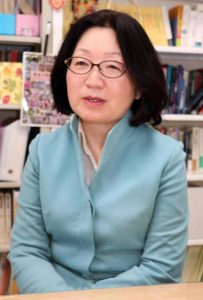Views on Ukraine invasion from A-bombed Hiroshima’s perspective: Mari Katayanagi, 57, professor, Hiroshima University Graduate School of Humanities and Social Sciences
May 25, 2022
Call for active communication of Hiroshima’s experience in reconstruction from A-bombing
Russia’s invasion of Ukraine is unquestionably a violation of international law. Before Russia made its decision to act recklessly, the international community should have taken seriously Russia’s concerns about the eastward expansion of the North Atlantic Treaty Organization (NATO). From Russia’s perspective, NATO’s military power is a significant threat. When Ukraine signaled its intent to join NATO, Russia’s armed attack should have been anticipated.
NATO might have believed that increasing the number of member nations would diminish the threat from Russia. However, that idea does not hold up when confronted with nuclear weapons. The world has been reminded that even with NATO’s continued expansion of influence, world peace and security would be instantly diminished by NATO rival Russia’s possession of nuclear weapons.
Between 2001 and 2003, I worked as a senior advisor at the Embassy of Japan in Bosnia and Herzegovina. Traveling around Bosnia, where about half of the population had become refugees from the conflict in the former Yugoslavia, I worked on generating economic opportunities for those who were returning to their war-torn country. Based on discussions with local people about reconstruction measures that would be needed for their livelihoods, we were able to provide support such as funding to purchase agricultural equipment for use by farming cooperatives.
Due to Russia’s invasion, large-scale devastation continues across Ukraine, lengthening the projected time required for reconstruction. I hope the international community, including the Japanese government, can continue offering supplemental support. However, simply handing over monetary assistance is a one-time occurrence. The international community should therefore engage with local residents regarding the kind of support required for the future. Residents thinking and acting on their own will lend greater power to reconstruction efforts.
Regarding the acceptance of refugees, more than a few people might be fearful of such people and believe that increased numbers of refugees could lead to deterioration in public security. Those images, though, are baseless fabrications. Why is the war happening? Why are people being forced to flee their own country? We all must turn our attention to the rest of the world and do our best to obtain an accurate understanding of the situation. Important is the willingness to engage with refugees, starting from the seemingly insignificant gesture of offering greetings to them in passing.
I would like people, especially those in Hiroshima, to actively communicate through social media, for example, their experiences in the reconstruction of the A-bombed city. This would provide courage and hope to Ukraine’s people, who must be disheartened by the tragedy unfolding before their eyes.
What is peace and how do we protect it? There are many such questions with no easy answers. Just talking about peace does not mean the listener will change overnight. I hope that continued communication of the experiences in reconstruction of the A-bombed city leads to an increase in the number of people willing to consider the basic issues of peace and human rights. (Interviewed by Nene Takahashi)
Profile
Mari Katayanagi
Born in Yokohama City, Ms. Katayanagi earned a doctoral degree in law from the Law School at the Graduate School of Warwick University, in the United Kingdom. She served as senior advisor at the Embassy of Japan in Bosnia and Herzegovina and as a senior research fellow at the JICA Research Institute. Assuming her current position at Hiroshima University in 2014, she specializes in international law and peacebuilding.
(Originally published on May 25, 2022)








